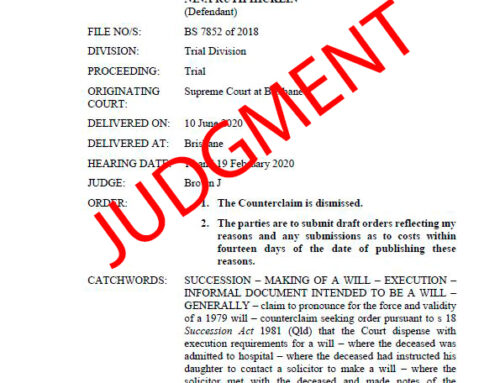 An Enduring Power of Attorney is one of the most powerful documents you will ever sign in your life time. The document allows the person making it, known as the Principal to appoint another to act on their behalf in relation to their financial affairs and their personal/health matter. Whilst there are certain ‘special’ matters that cannot be attend to any person other than the Principal such as, voting at an election, making a new Will, consenting to adoption or marriage, amongst other things, the person or people appointed as you attorney can make decisions about almost every other matter that you can think of.
An Enduring Power of Attorney is one of the most powerful documents you will ever sign in your life time. The document allows the person making it, known as the Principal to appoint another to act on their behalf in relation to their financial affairs and their personal/health matter. Whilst there are certain ‘special’ matters that cannot be attend to any person other than the Principal such as, voting at an election, making a new Will, consenting to adoption or marriage, amongst other things, the person or people appointed as you attorney can make decisions about almost every other matter that you can think of.
When choosing your attorney you must be extremely careful. We have only this year managed to settle a matter in which our client’s only daughter misappropriated monies in excess of $300,000 while our client was temporarily incapacitated due to mental health issues. The amount recovered after a period of nearly 18months and multiple court appearances was about one-third of the sum misappropriated.
Whilst the courts can make orders requiring attorneys to return monies taken and to account for their spending the action that the courts are able to take is akin to shutting the stable door long after the horse has bolted. It is an unfortunate reality that not all relatives are a good choice as attorney. Choosing the eldest child because they are the eldest or a sibling because they are the only or favourite sibling ignores the reality that your eldest child or only/closest sibling might be a wonderful person and also spectacularly inept at managing their own affairs never mind yours.
If you lose capacity, and do not have an Enduring Power of Attorney, an application can be made to the Queensland Civil and Administrative Tribunal for the appointment of an Administrator and, in some cases, a Guardian to manage your affairs for you during the period of your incapacity. This application is generally by a person with a close personal connection to you. Whilst the application process is costly and lengthy when compared to appointing an attorney by and Enduring Power of Attorney document the person appointed is required to provide financial records and accounting of the manner in which your affairs are being managed to the tribunal on a regular basis. This process allows the tribunal to review your affairs on a regular basis and assess the manner in which the Administrator/Guardian is handling your affairs thereby providing checks and balances that would not otherwise exist.
The preference should always be to appoint your own attorney while you have the capacity to do so, however, for those who have no one that they trust implicitly to act in their best interests when they can no longer due to either temporary or permanent incapacity due consideration should be given to whether the appointment of attorneys by an Enduring Power of Attorney is a risk worth taking.





